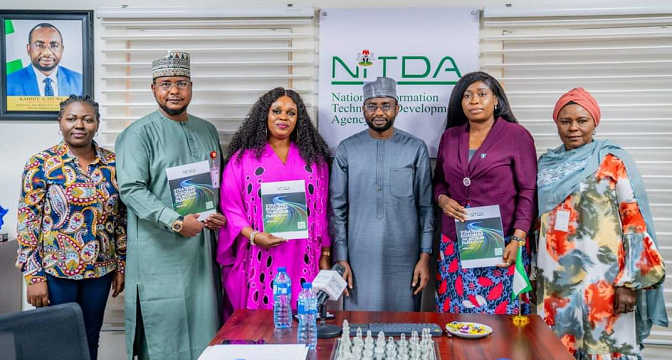The National Information Technology Development Agency (NITDA) has revealed plans to intensify its campaign in taking the benefits of digital technology to all the local governments across the country.
This was disclosed by the NITDA Director General, Kashifu Inuwa when he played host to the Senior Special Advisers to President on Community Engagement – South East, Barr Chioma Nweze; South West, Ms Moremi Ojudu and North West, Hon. Abdallah Tanko Yakassai who visited the Agency to discuss possible areas of collaboration on Nigeria’s digital transformation journey.
This gesture is in total alignment with the present administration’s priority areas, particularly in the area of reforming the economy for sustained inclusive growth.
While stating the agency’s vision for Nigeria where inclusive economic growth is fostered through technological innovation, the NITDA DG noted that the vision aligned with the president’s eight priority areas.
“The President wants to Reform the Economy to Deliver Sustained Economic Growth; Strengthen National Security for Peace and Prosperity; Boost Agriculture to Achieve Food Security; Boost Infrastructure and Transportation as Enablers of Growth; Focus on Education, Health and Social Investment as Enablers of Development; Accelerate Diversification through Digitisation, Industrialisation, Creative Art and Innovation; and Improve Governance for Effective Service Delivery to Citizens,” he said.
He added that the agency recently crafted its Strategic Roadmap and Action Plan (SRAP 2.0) 2024-2027, and its pillars are the tool that will help Mr President in delivering on all the presidential priority areas.
Enumerating the eight pillars of the SRAP, Inuwa highlighted “Foster Digital Literacy and Cultivate Talents” as one of the most important pillars the document is anchored on where inclusivity is pronounced.
“To ensure we are inclusive, we need to get our citizens to be digitally literate, so we developed the National Digital Literacy Framework with an ambitious target of achieving 95 percent digital literacy by 2030 but Mr President cited a mid-term target for us to achieve 70 percent by 2027,” he stated.
He further said that the agency is collaborating with the Ministry of Education in infusing digital literacy into all academic institution’s curricula while at the same time developing standard training with certifications that would be a prerequisite for securing government employment.
“We have already worked with the Head of Service to put it as a requirement for government workers to be digitally literate. But for the market people, artisans and so on, what they need is the literacy to use digital devices to access internet banking, government digital services and others. We have therefore been exploiting many channels to deliver them through TV programmes, social media, radio, roadshows and so on,” he averred.
The NITDA Boss stated that the 3 Million Tech Talent programme was another initiative of the Ministry of Communications, Innovation and Digital Economy in collaboration with the agency to identify skill gaps in the country and build youth’s capacity on skills in high demand locally and internationally.
“We have started the training and so far we have trained over 30,000 and completed the first phase which is a pilot. We are now executing the second phase of the training,” he said.
While giving deep insight into the other seven strategic pillars of Building a Robust Technology Research Ecosystem; Strengthening Policy Implementation and Legal Framework; Promoting Inclusive Access to Digital Infrastructure and Services; Strengthening Cybersecurity and Enhance Digital Trust; Nurturing an Innovative and Entrepreneurial Ecosystem; Forging Strategic Partnerships and collaborations and lastly, Cultivating a Vibrant Organisational Culture and an Agile Workforce in NITDA, Inuwa shared the various infrastructures, innovative solutions, sponsorships and training programmes the government has been offering nationwide.
In his remark, Hon. Yakassai appreciated the DG NITDA for his wonderful presentation by sharing insights into the various activities of the agency to ensure a digitally empowered nation by building the digital capacities of Nigerians.
He, however, expressed his team’s willingness to collaborate with the agency in the areas of propagating the agency’s activities to the grassroots throughout the 774 local governments in the country.
“Mr President is a grassroots person that is why he created this office so that we make sure whatever the government is doing is taken down to the grassroots level and we need to show the people the importance of your programmes and how they can key into it,” he stated.

